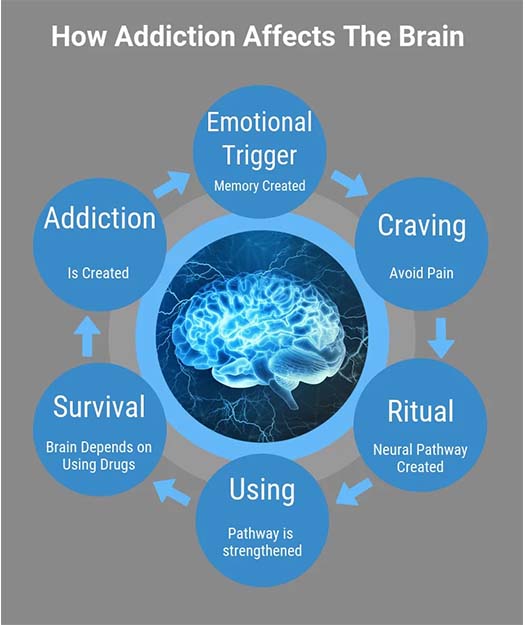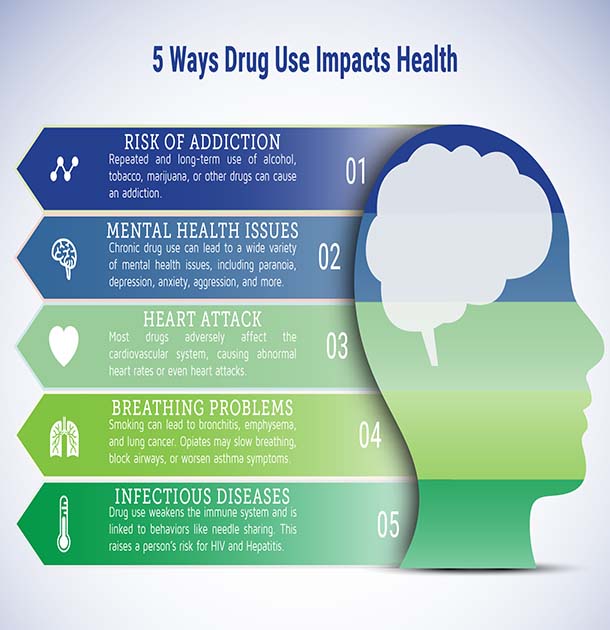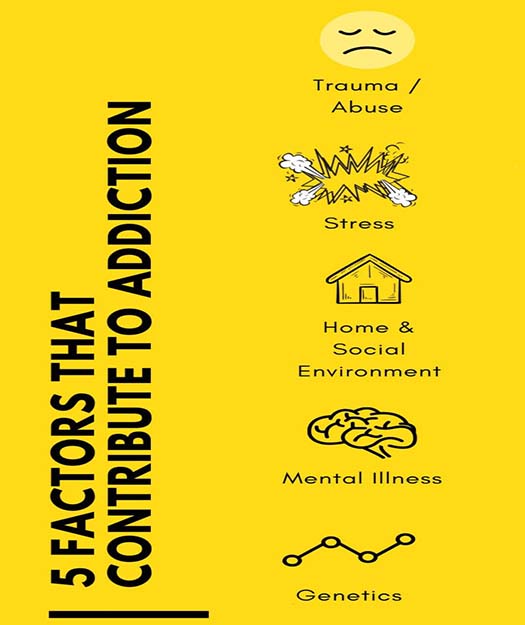When you're addicted to drugs or alcohol, it's hard to see past the short term. Your life begins to revolve around substances. Just getting through the day can become a struggle. The long-term effects of drugs on the body cannot be ignored though. Drug addiction can have severe consequences for your physical and mental health. If you or a loved one is struggling with addiction, please know that recovery is possible. You can prevent further damage to your health and build a fulfilling life that doesn't include substance abuse.

Drugs interact with chemicals in your brain and body to make you feel a certain way. Illegal drugs typically have no medical benefits and damage your health. Some prescription drugs help regulate moods, sleep, and manage pain, but they can also have serious complications when misused.
Taking higher-than-recommended doses or taking prescription drugs when you don't need them for medical purposes can cause mind-altering effects. Not only can they make you high, drugs can also cause you to act erratically. Abusing drugs increases your risk for getting hurt or making bad decisions that can have lasting consequences.

While there are numerous factors that influence a person's risk of addiction, before looking at them, it is important to understand exactly what addiction is. Drug addiction is a disease of the brain that that has the potential to actually change the brain's structure and workings. Like diseases of other organs of the body, drug addiction impedes the regular functioning of the brain. While drug addiction is a chronic problem, it can be treated, and it is preventable.
Drugs impact the brain in a variety of ways. They cause interference with how nerve cells communicate and increase the amount of the chemical dopamine. When a person engages their addiction, the brain releases dopamine. The extra dopamine released means that the person will want to experience the high again and again. As the body adjusts to the extra dopamine and the resulting high, the person will no longer be able to experience feeling good by activities other than doing drugs and will need to keep using in order to maintain that pleasurable feeling. The need to seek out and use drugs will eventually overwhelm other desires, so that pleasure once obtained by enjoying the company of family or friends will be replaced by this almost irrational need to seek out drugs.

When you're addicted to drugs or alcohol, it's hard to see past the short term. Your life begins to revolve around substances. Just getting through the day can become a struggle. The long-term effects of drugs on the body cannot be ignored though. Drug addiction can have severe consequences for your physical and mental health. If you or a loved one is struggling with addiction, please know that recovery is possible. You can prevent further damage to your health and build a fulfilling life that doesn't include substance abuse.

As addiction to drugs and alcohol in the U.S. is an ongoing concern, scientists and researchers have studied just why people become addicts while others can use drugs and alcohol without becoming addicted to them. Though many people will have multiple factors that contribute to their addiction, others may only have a few, and some may only have one factor that contributes to their addiction. These various factors of addiction and their influences will vary greatly from person to person.
Taking higher-than-recommended doses or taking prescription drugs when you don't need them for medical purposes can cause mind-altering effects. Not only can they make you high, drugs can also cause you to act erratically. Abusing drugs increases your risk for getting hurt or making bad decisions that can have lasting consequences.
Addiction Home Remedies
Genetics- If you have someone in your family who has been addicted to drugs or alcohol in the past, that doesn't mean that you will necessarily become addicted as well. Nevertheless, because your family member was an addict, you will have a greater propensity to become addicted if you choose to use drugs. Statistics show that (along with other factors), genetics may contribute 40-60% to the risk for drug addiction. Stage of Development - Research has proven that the earlier someone uses drugs, the more likely they will be to develop an addiction when they are older. One of the primary reasons for this is that brain development is very significant during the teen years. The effects of drugs used during these years can make someone more vulnerable to addiction as they get older. The National Institute on Alcohol Abuse and Alcoholism conducted a survey and learned that adults between the age of 18 and 24 were most likely to have both alcohol use disorders and other drug addictions. Gender - Though there are differences in how drugs impact men's versus women's bodies, men are more likely to use marijuana and alcohol while women are more likely to use and become addicted to drugs that decrease anxiety. Overall, men statistically are more likely to use and abuse drugs than women, though this has been changing in recent years. Mental Illness - Those with a variety of mental illnesses are more likely to use and abuse drugs for a number of reasons. It is possible that drugs give them a sense of euphoria and a sense of well-being. Additionally, illnesses of a mental variety will impact the same parts of the brain as do drugs thereby increasing the potential for abuse. Ethnic Group - Studies have shown that different ethnic groups metabolize drugs at a different rate, which means that some groups are actually more sensitive to certain drugs than others. In addition, while the impact of society can also influence drug use, studies show that there is greater use of drugs by white Americans rather than African-Americans or Hispanics. Moreover, the negative effects of drug use such as AIDS have a greater impact on minority groups. Stable Home Environment - If the parents are very involved and have provided structure for the children, there is a decreased chance that the children will use and/or abuse drugs. If the home environment is unstable, and the parents are addicts themselves or if they have some type of mental illness, it is more likely that the children may use and abuse drugs. Ease of Obtaining Drugs - The more available the drugs are for a person, whether they are available at home, school or at a friend's house will determine whether someone will try or start using and possibly abusing drugs. Influence of Friends - While the term "getting in with a bad crowd", may often be used by older members of society, they aren't far off the mark when considering how choosing one's friends can impact the likelihood of becoming a drug user. If someone is friends with those who encourage and use drugs themselves, it may be difficult to abstain from drug use and be the only one not using. Failure in School - A sign that a teenager may be using drugs is poor academic performance. Those teenagers who do well in school and have bonded with teachers, coaches or other adults outside of the family unit are less likely to use drugs. Stress - Stress stems from a variety of situations. Someone may feel stress from the poverty in which they live, or they may feel pressured to achieve perfection. Additionally, stress can take the form of abuse, whether it is sexual, physical or psychological. People who experience types of stress may be more likely to use drugs. That is why youth are encouraged to join groups that abstain, such as some sports groups or church groups.